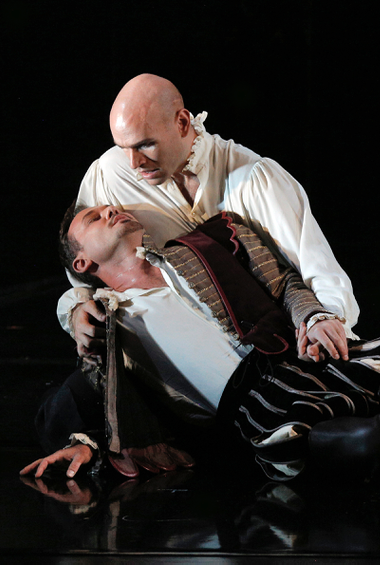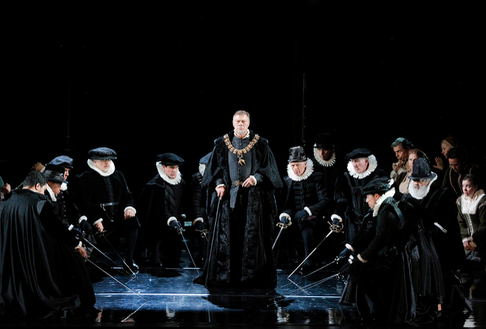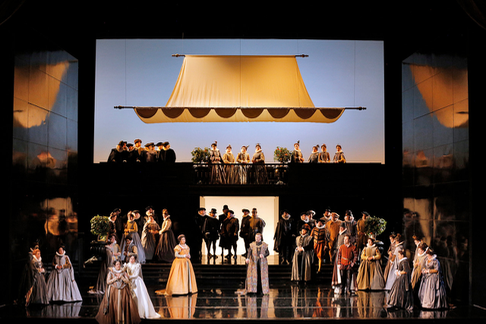
21 Jun 2016
Don Carlo in San Francisco
Not merely Don Carlo, but the five-act Don Carlo in the 1886 Modena version! The welcomed esotericism of San Francisco Opera’s extraordinary spring season.
English Touring Opera are delighted to announce a season of lyric monodramas to tour nationally from October to December. The season features music for solo singer and piano by Argento, Britten, Tippett and Shostakovich with a bold and inventive approach to making opera during social distancing.
This tenth of ten Live from London concerts was in fact a recorded live performance from California. It was no less enjoyable for that, and it was also uplifting to learn that this wasn’t in fact the ‘last’ LfL event that we will be able to enjoy, courtesy of VOCES8 and their fellow vocal ensembles (more below …).
Ever since Wigmore Hall announced their superb series of autumn concerts, all streamed live and available free of charge, I’d been looking forward to this song recital by Ian Bostridge and Imogen Cooper.
The Sixteen continues its exploration of Henry Purcell’s Welcome Songs for Charles II. As with Robert King’s pioneering Purcell series begun over thirty years ago for Hyperion, Harry Christophers is recording two Welcome Songs per disc.
Although Stile Antico’s programme article for their Live from London recital introduced their selection from the many treasures of the English Renaissance in the context of the theological debates and upheavals of the Tudor and Elizabethan years, their performance was more evocative of private chamber music than of public liturgy.
In February this year, Albanian soprano Ermonela Jaho made a highly lauded debut recital at Wigmore Hall - a concert which both celebrated Opera Rara’s 50th anniversary and honoured the career of the Italian soprano Rosina Storchio (1872-1945), the star of verismo who created the title roles in Leoncavallo’s La bohème and Zazà, Mascagni’s Lodoletta and Puccini’s Madama Butterfly.
Evidently, face masks don’t stifle appreciative “Bravo!”s. And, reducing audience numbers doesn’t lower the volume of such acclamations. For, the audience at Wigmore Hall gave soprano Elizabeth Llewellyn and pianist Simon Lepper a greatly deserved warm reception and hearty response following this lunchtime recital of late-Romantic song.
Collapsology. Or, perhaps we should use the French word ‘Collapsologie’ because this is a transdisciplinary idea pretty much advocated by a series of French theorists - and apparently, mostly French theorists. It in essence focuses on the imminent collapse of modern society and all its layers - a series of escalating crises on a global scale: environmental, economic, geopolitical, governmental; the list is extensive.
For this week’s Live from London vocal recital we moved from the home of VOCES8, St Anne and St Agnes in the City of London, to Kings Place, where The Sixteen - who have been associate artists at the venue for some time - presented a programme of music and words bound together by the theme of ‘reflection’.
'Such is your divine Disposation that both you excellently understand, and royally entertaine the Exercise of Musicke.’
Amongst an avalanche of new Mahler recordings appearing at the moment (Das Lied von der Erde seems to be the most favoured, with three) this 1991 Mahler Second from the 2nd Kassel MahlerFest is one of the more interesting releases.
‘And there was war in heaven: Michael and his angels fought against the dragon; and the dragon fought and his angels, And prevailed not; neither was their place found any more in heaven … that old serpent … Satan, which deceiveth the whole world: he was cast out into the earth, and his angels were cast out with him.’
If there is one myth, it seems believed by some people today, that probably needs shattering it is that post-war recordings or performances of Wagner operas were always of exceptional quality. This 1949 Hamburg Tristan und Isolde is one of those recordings - though quite who is to blame for its many problems takes quite some unearthing.
There was never any doubt that the fifth of the twelve Met Stars Live in Concert broadcasts was going to be a palpably intense and vivid event, as well as a musically stunning and theatrically enervating experience.
‘Love’ was the theme for this Live from London performance by Apollo5. Given the complexity and diversity of that human emotion, and Apollo5’s reputation for versatility and diverse repertoire, ranging from Renaissance choral music to jazz, from contemporary classical works to popular song, it was no surprise that their programme spanned 500 years and several musical styles.
The Academy of St Martin in the Fields have titled their autumn series of eight concerts - which are taking place at 5pm and 7.30pm on two Saturdays each month at their home venue in Trafalgar Square, and being filmed for streaming the following Thursday - ‘re:connect’.
The London Symphony Orchestra opened their Autumn 2020 season with a homage to Oliver Knussen, who died at the age of 66 in July 2018. The programme traced a national musical lineage through the twentieth century, from Britten to Knussen, on to Mark-Anthony Turnage, and entwining the LSO and Rattle too.
With the Live from London digital vocal festival entering the second half of the series, the festival’s host, VOCES8, returned to their home at St Annes and St Agnes in the City of London to present a sequence of ‘Choral Dances’ - vocal music inspired by dance, embracing diverse genres from the Renaissance madrigal to swing jazz.
Just a few unison string wriggles from the opening of Mozart’s overture to Le nozze di Figaro are enough to make any opera-lover perch on the edge of their seat, in excited anticipation of the drama in music to come, so there could be no other curtain-raiser for this Gala Concert at the Royal Opera House, the latest instalment from ‘their House’ to ‘our houses’.
"Before the ending of the day, creator of all things, we pray that, with your accustomed mercy, you may watch over us."

Not merely Don Carlo, but the five-act Don Carlo in the 1886 Modena version! The welcomed esotericism of San Francisco Opera’s extraordinary spring season.
Everyone knows that Don Carlos was written in French, and premiered in 1866 at the Paris Opera. Like all grand opera productions in Paris it included a ballet. An Italian translation quickly surfaced for performances in London the next year and then in all major Italian theaters. All sorts of modifications to the opera’s extraordinary length were taken, resulting finally in the Verdi sanctioned four act, no ballet La Scala version of 1884. It is said that Verdi may not have objected to the addition of the original first act (in Italian) for performances in Modena in 1886.
And therefore in San Francisco in 2016. Don Carlo has been done in San Francisco both in the four-act La Scala version and in a five-act Don Carlos French version, though without the ballet (Verdi originally insisted that the opera must include the ballet). With hoped for new directions at San Francisco Opera perhaps we will some day soon have the opera as Verdi intended.
It can come as no surprise that the Italian language Modena five-act version was chosen for these performances given that Italian conductor Nicola Luisotti is the SFO music director. Though an unexpected double-take could not be helped when we heard words that simply do not belong in Fontainebleau. While strange words were probably not meant to be the old theater trick of putting the audience on edge (stage directors sometimes do it by forcing blinding light into your eyes), it had that effect.
So it was as if we were hearing this magnificent opera for the first time. Conductor Luisotti held us spell bound for four and one half hours, every possible quiver or roar of emotion poured forth, never once did we feel the score being pushed for effect, nothing too fast, nothing too slow. Always the Verdi genius was foremost (and not the conductor’s). Evidently Luisotti had met his match. Finally.
 René Pape as Philip II
René Pape as Philip II
In the fourth and fifth acts this Don Carlo venerated the centuries old, creaky, passé opera seria style with its succession or arias. After King Philip’s momentous “Ella giammai m’amo” Rodrigo dies with his very moving “Per me giunto é il dì supremo.” Then there is the most trying aria in the repertory, not because of emotional or technical difficulties but because it is of extended length and comes four hours into the opera. Philip’s wife and Don Carlo’s lover Elisabeth delivered “Tu che le vanità conoscesti del mondo” in such exquisitely soaring voice that an already exhausted audience gave it the biggest ovation of the evening!
On the basis of the casting, American tenor Michael Fabiano as Don Carlo and Polish baritone Mariusz Kwiecién as the Marquis of Posa the opera could well be renamed Carlo and Rodrigo as these two splendid singing actors made this opera more about the love of two men — sublimated into freeing the oppressed — and its ramifications than about the thwarted betrothal of Don Carlo to Elisabetta and its ramifications. From the first moments of the pasted on first act, Don Carlo’s romance “Io la vidi” (better known as “Je l’ai vu dans son sourire”), we knew that tenor Fabiano was born to this role, finding sufficient Verdi vocal heft and color to compete musically with kings and queens and a spurned woman while he sustained the character of a weak and troubled epileptic youth. Rodrigo, the Marquis de Posa, baritone Kwiecién found the seductive, the duplicitous and the sacrificial, confusing everyone with beautiful, convincing singing. Both men — and maybe most of all Verdi — made this edgy staging very real and very moving.
The opera Don Carlo is also about power — ecclesiastical and secular power. Power is a very complicated question in the Verdi oeuvre and he discusses it in great depth in Don Carlo. Here King Philip II usurps his son’s fiancé to gain political power, and finally gives his son to the Inquisition to maintain his power. The Philip II of bass René Pape found very real humanity for this unhappy king in the always touching “Ella giammai m’amo” but otherwise did not create the overwhelming sense of suffocating authority that might underlie these four and one half hours.
Andrea Silvestrelli was over parted as the Grand Inquisitor, his roughness of voice and tired presence did not adequately color the manipulative cunning and sinister reasoning of such an instrument and technique of power. Still the famous bass duet was convincing in its revelation of the weakness and vulnerability of Philip II. The old monk who begins and ends the opera (the four act version) was sung by Adler Fellow Matthew Stump. An old, tired presence would be preferred to balance the maturity of the cast, and the maturity of the subject matter of the opera.
Texas soprano Ana Maria Martinez brought us a beautifully sung if pallid Elisabetta — the role itself does find much presence in this male world until the fifth act aria (see above) when she essentially has the last word, decrying the vanities of the world. Verdi’s snarling mezzo, Eboli was well sung by Bulgarian mezzo soprano Nadia Krasteva who fulfilled her function as catalyst for Philip II’s lament without ever have fully taken the stage, even in her famous “O don fatal.”
 Production by Emilio Sagi, set design by Zack Brown
Production by Emilio Sagi, set design by Zack Brown
The pedestrian production was the remount of a 1998 San Francisco Opera production by Spanish director Emilio Sagi (note that all productions in this spring season come from 1998). An opera of the stature of Don Carlo and a quality cast deserve a production that can plumb the theatrical depths of this masterpiece.
If this 2016 early summer San Francisco Opera season had some real interest, consider the 2017 early summer season: Rigoletto, Don Giovanni and La Boheme, all in oft re-cycled productions.
Michael Milenski
Cast and production information:
Don Carlo: Michael Fabiano; Elisabetta: Ana Maria Martinez; Princess Eboli: Nadia Krasteva; Rodrigo: Mariusz Kwiecien; Philip II: René Pape; The Grand Inquisitor: Andrea Silvestrelli; A Monk; Mathew Stump; Tebaldo: Nian Wang; A Heavenly Voice: Toni Marie Palmertree; Count Lerma: Pene Pati. Chorus and Orchestra of San Francisco Opera. Conductor: Nicola Luisotti; Director: Emilio Sagi; Designer: Zack Brown; Lighting Designer: Gary Marder. War Memotial Opera House, San Francisco, June 15, 2016.